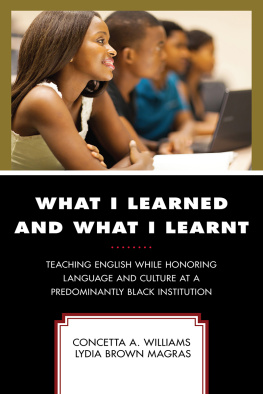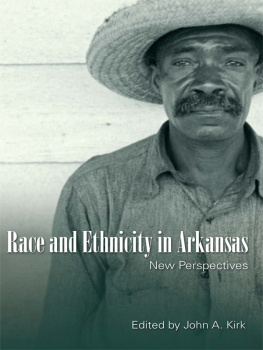
Copyright 2010 by The University of Arkansas Press
All rights reserved
Manufactured in the United States of America
ISBN: 978-1-55728-675-8
14 13 12 11 10 5 4 3 2 1
Text design by Ellen Beeler

The paper used in this publication meets the minimum requirements of the American National Standard for Permanence of Paper for Printed Library Materials Z39.48-1984.
Library of Congress Cataloging-in-Publication Data
Robinson, Charles F. (Charles Frank)
Remembrances in Black : personal perspectives of the African American experience at the University of Arkansas, 1940s-2000s / Charles F. Robinson II, Lonnie R. Williams.
p. cm.
Includes bibliographical references.
ISBN 978-1-55728-953-7 (cloth : alk. paper)
1. University of Arkansas, FayettevilleStudents--Interviews. 2. University of Arkansas, FayettevilleEmployeesInterviews. 3. African AmericansEducation (Higher)ArkansasFayettevilleHistory20th century. 4. African American college studentsArkansasFayettevilleHistory20th century. 5. African AmericansArkansasFayettevilleSocial conditions20th century. 6. Education, HigherSocial aspectsArkansasFayettevilleHistory20th century. 7. Discrimination in educationArkansasFayettevilleHistory20th century. 8. College integrationArkansasFayettevilleHistory20th century.
I. Williams, Lonnie R., 1954 II. Title.
LD233.R63 2010
378.767'14--dc22 2010031530
Cover images, top, left to right: Terry G. Lee, courtesy Portrait Innovations; Patricia L. Greene Griffen, courtesy Martyn Griffen; Harold B. Betton, courtesy Jorden Davie; Margaret Clark, courtesy John Baltz; Waldo Bronson, courtesy Beverly Bronson; bottom: Tanisha L. Joe Conway, courtesy Jess Setzler/AETN; Gerald Jordan, courtesy Russell Cothren/ University Relations; Dinah Gail Gant, courtesy T. Gant-Gaines Photography; Jack Kearney, courtesy Amy Hughes/Names and Numbers Phone Books; and Ebony Oliver Wyatt, courtesy Legacy House Photography.
Thanks to the Gordon and Izola Morgan Publications Fund, whose support made this book possible.
ISBN-13: 978-1-61075-342-5 (electronic)
This book is dedicated to the memory of Dr. Nudie Williams, former associate professor of history at the University of Arkansas, Fayetteville. Dr. Williams was a friend and mentor to both authors as well as many others during his tenure at the University of Arkansas, 19762003.
DR. NUDIE EUGENE WILLIAMS
OCTOBER 16, 1936 JULY 16, 2003
Acknowledgments
This oral history is largely the idea of my friend and coeditor, Dr. Lonnie Williams. Some years ago when I approached him about my interest in writing a new historical monograph about desegregation at the University of Arkansas, Lonnie suggested that we first gather the stories of the participants in that history. Without Lonnie, this project would have been virtually impossible because he had the connections to the historical characters in this work to bring it to fruition. I am very grateful Lonnie allowed me to take this journey with him. Also, I would like to thank all of those wonderful people who shared their truly remarkable stories with us. Furthermore, I extend my gratitude to Andrea Cantrell, Dr. Tom Kennedy, and Jason Blankenship for their assistance in helping me to find the historical resources that comprise the introductions to each chapter. With regard to underwriting the considerable costs associated with the transcribing, I am deeply indebted to Dr. Todd Shields and the Diane D. Blair Center for Southern Politics and Societies at the University of Arkansas. Finally, I thank God for giving me the power to do anything that serves to help, heal, and constructively inform humanity. I believe that this work fits that category.
Charles Robinson, PhD
I thank God for allowing this project to happen and for His continuous blessings. I am very grateful for the friendship and collaboration of Dr. Charles Robinson in bringing this project to life. To those who unselfishly, and for some painfully, provided the interviews, I cannot thank you enough. Special thanks to Mary and my family for their constant support and belief; Drs. Gordon Morgan and Izola Preston for their earlier work on the black experience at the U of A and their friendship; Gigi for transcription services; Angela, Kelley, and Laura for their technical support; Larry Malley and the University of Arkansas Press for accepting this project; and the many friends and colleagues who are constantly encouraging, particularly the crew.
Lonnie R. Williams, EdD
Foreword
As I sit here, winding down from what has proven to be yet another rewarding and long day in academe, my evening ritual of checking the mail while intermittently watching the television set to see what the days national news conveys has left me both intrigued and saddened. Roland S. Martin, CNN political analyst, is sandwiched between Soledad OBrian, CNN anchor, and Peter Beinart, senior political writer for the Daily Beasteach is being interviewed on Anderson Cooper 360. The subject of their discussion is the contemporary revival of the seminal doll experiments conducted by Kenneth and Mamie Clark in the 1940s. Most shocking is that some seventy years later, African American children still find that the doll that most looks like them is at best bad and worst evil. Yet, from where did these constructions come? What makes being black or the representation of blackness evil? Have black people always felt this way? Have they (we) always had these misgivings about self-worth and value?
Fortunately, my sadness is tempered by my reflection on the words proffered by important black figures, who were able to share with me during my formative years powerful narratives and counternarratives that framed a different story about my blackness. Much like the stories and masterful accounts that are conveyed in Remembrances in Black: Personal Perspectives of the African American Experience at the University of Arkansas, 1940s2000s, I have been able to frame an identity that is based on resilience and strength. As Robinson and Williams state, This volume is an attempt to better understand the experiences of African Americans at the University of Arkansas on the Fayetteville campus. What each one of these personal accounts provides is background to the milestones and accomplishments that African Americans, not only at the University of Arkansas but also in other contexts within and outside of academe, have been able to enjoy in the foreground. As the editors so eloquently state, Remembrances in Black prompts the reader to work toward better comprehending not only the challenges to integration in our past, but the residual barriers that still remain.
A common refrain that is often echoed in the African American community, particularly among African American church-goers is, Give me my flowers while I yet live. This mantra, with its simple yet profound meaning, is exactly what these editors have done for the men and women included in this volumethey have given them their flowers. They have provided these storytellers with the space to create and share their experiences as students, faculty, and staff at the University of Arkansas across a continuum that spans Jim Crow to millennial culture. In addition to a vivid recounting of what it has meant to matriculate at the university, both historically and contemporarily, this book also fills an important void in the literature; namely, the authentic narrative accounts of students of color who attend predominantly white institutions (PWIs).







 The paper used in this publication meets the minimum requirements of the American National Standard for Permanence of Paper for Printed Library Materials Z39.48-1984.
The paper used in this publication meets the minimum requirements of the American National Standard for Permanence of Paper for Printed Library Materials Z39.48-1984.